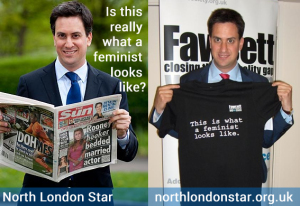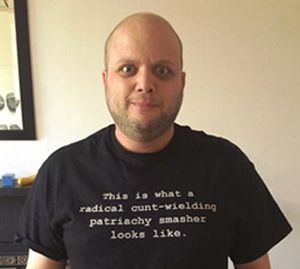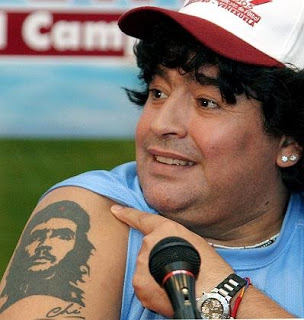The rise of T-Shirt feminism?
by Jim Jepps
David Cameron refused to pose wearing the Fawcett Society T-Shirt “This is what a feminist looks like”. It’s an existential poser to ask whether someone who’s obviously not a feminist can be less of a feminist. It’s not exactly news that the leader of the Conservative Party is more Margaret Thatcher than Germaine Greer.
 But who is worse, David Cameron for being honest enough not to claim to be a feminist – something he knows full well that he is not – or Nick Clegg who wants to suckle up to more progressive voters while happily presiding over a government that is taking gender equality backwards?
But who is worse, David Cameron for being honest enough not to claim to be a feminist – something he knows full well that he is not – or Nick Clegg who wants to suckle up to more progressive voters while happily presiding over a government that is taking gender equality backwards?
The World Economic Forum recently released a report showing that Britain is slipping down the world rankings measuring female economic participation, education, health and political involvement. This year Britain dropped out of the world top twenty to 26th place as women have been made to bear the heaviest burden of the economic crisis.
There are more men in parliament today than the total number of women MPs ever. Is this really “what feminism looks like”? At the last election women were a minority of candidates for Westminster, and were less likely to be given “safe” seats. Of the three largest parties 30% of Labour’s candidates were women, 24% of Tory candidates, and just 22% of Liberal Democrat candidates were women – yet Nick Clegg can pop on a T-shirt and it’s all forgotten? At least Cameron had the decency not to pretend to be on board.
Cameron won’t wear feminism because he’s outsourced his hypocrisy to his Coalition partners in crime. We’re in danger of turning politics into some kind of consumer product devoid of real content if we allow who turns up for which photoshoot to become more important than what they do in government.
So what’s in a label anyway?

T-Shirts available from Kate Smurthwaite
The Fawcett Society are trying to navigate a tension between trying to popularise feminism, making it a term adopted by millions rather than a core of committed activists, and hollowing the term out to such an extent that they are willing to promote the leaders of a government who have presided over a grim widening of the gender equality gap. They won’t always get that tricky balance right.
Part of that difficulty is because the word is contested even among proper feminists, who do more than put on a t-shirt for a press shoot.
Pat Robertson, the US media mogul and hard-right Christian defined feminism as “a socialist, anti-family, political movement that encourages women to leave their husbands, kill their children, practice witchcraft, destroy capitalism and become lesbians” but we can all agree that this is only 90% of the truth.
Marie Shear put it most simply when she said that “feminism is the radical notion that women are people” but for many feminists their politics revolve around a sophisticated understanding of structural inequalities in society and patriarchy.
Some feminists find the notion of inherent biological differences between the sexes as over exaggerated and inherently reactionary. For others the belief that women are innately more progressive, less prone to war and abuse than men is central to their version of feminism. Adopting the label is the beginning of a conversation, not the end of it.
The author Caitlin Moran defined feminism as “simply the belief that women should be as free as men, however nuts, dim, deluded, badly dressed, fat, receding, lazy, and smug they might be.”
However, while equality sounds uncontentious, even this is open for debate. Germaine Greer said “equality is an incredibly conservative aim” and we should be fighting for “women’s liberation”. We don’t challenge injustice by simply mixing up who gets to exploit and oppress others. We can’t simply break glass ceilings like getting more women onto company boards if it leaves their nannies just as poorly paid, unrepresented and over worked as before.
We are what we wear?
 Feminism is not the only term this applies to of course. If someone tells you they are a socialist you still need to find out more before you can place them politically. After all if people like Tony Blair and Robert Maxwell could, selectively, describe themselves as such you can’t assume very much.
Feminism is not the only term this applies to of course. If someone tells you they are a socialist you still need to find out more before you can place them politically. After all if people like Tony Blair and Robert Maxwell could, selectively, describe themselves as such you can’t assume very much.
Even terms that appear to be fairly tight, like Marxist, still tell you little meaningful about the person until you know more. Are they involved in building their local People’s Assembly? Or do they spend their time dissecting the semiotics of obscure academic texts? Perhaps they are a member of a tiny cult like groupescule who spend hours telling each other how everyone else is wrong, or are they a real class warrior on the front line being battered by the police? We need to dig far deeper than their label.
All of this is not to say that broad political definitions like left and right, feminist and environmentalist are contentless – it’s just that politics only becomes meaningful when we get beyond flag waving.
The definition of feminism cannot be simply being willing to put on a T-shirt with a slogan, just as wearing an image of Che Guevara doesn’t magically turn you into a Latin American guerrilla.
This government has systematically let women down. Every major policy from benefits reform, public sector cuts to government job losses have hit women harder than men. This is the meat of the issue.
All three party leaders were willing to have their picture taken with the noxious sexist rag The Sun – another day, another photo shoot. Why contaminate the term feminism by associating it with people like this?


Join the discussion